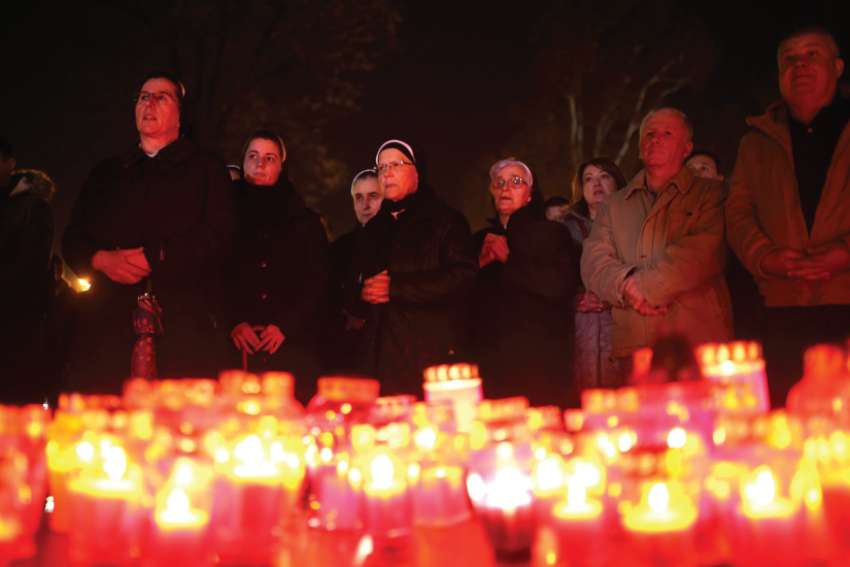Bosnian nuns and others pray for former Bosnian Croat military chief Slobodan Praljak, who committed suicide Nov. 29, seconds after the verdict in the UN war crimes tribunal in Mostar, Bosnia-Herzegovina.
CNS photo/Dado Ruvic, Reuters
Croatian bishops condemn war crimes verdicts
By Jonathan Luxmoore, Catholic News Service
The president of Croatia’s bishops’ conference has condemned what he called “unjust verdicts” at a United Nations war crimes trial after a jailed former military leader publicly committed suicide when his appeal was rejected.
“We have to live well with each other and co-operate, but we can’t build a future when lies are told about our history,” said Archbishop Zelimir Puljic of Zadar, Croatia.
“Unfortunately, this tribunal has acted from political motives and followed political goals in attempting to show everyone is equally guilty and responsible,” he said following the Nov. 29 suicide of Bosnian Croat military chief Slobodan Praljak, who died of heart failure after drinking potassium cyanide during a hearing with five other Croatian-Bosnian military leaders in The Hague.
In a Dec. 1 Croatian Radio interview, Puljic said he believed the International Criminal Tribunal for the former Yugoslavia had not “taken account of historical facts” in accusing the officers of a “joint criminal enterprise,” and the prosecution would not “contribute to reconciliation” with its “unjust verdicts.”
He added that he regretted Praljak’s action, but believed the general’s claim to be “giving his life for the truth.” He said the tribunal judge had “reacted indecisively and coldly,” without human compassion.
“(Praljak’s) final act cannot be approved, because nobody can take a life. But the circumstances need to be taken into account, as well as his disappointment in seeing this as the only way out,” the archbishop said.
Ninety political and military officials, two-thirds of them ethnic Serbs, have been convicted and sentenced by the tribunal for war crimes during the 1992-1995 Bosnian war. The conflict ended with the formation of separate Serb and Muslim territories in a single state after leaving 100,000 people dead and 2.2 million displaced.
Praljak’s appeal of a 20-year prison sentence was the last to be heard by the tribunal, which was to close Dec. 31. He denied being a war criminal and said he rejected the verdict “with contempt” before drinking the poison.
Puljic said the international community had helped end the war under the 1995 U.S.-brokered Dayton Peace Accords, but had also “done a terrible injustice” to Croats by denying them rights in the new state. He said the tribunal unjustly placed Croats “on the same pillar as Serbs,” ignoring that they were “victims of aggression” and had merely “defended themselves.”
Meanwhile, the bishops’ conference of Bosnia-Herzegovina said silence was “the most appropriate expression of feelings” after Praljak’s death, but added that it also believed Croats were victims of injustice.
Please support The Catholic Register
Unlike many media companies, The Catholic Register has never charged readers for access to the news and information on our website. We want to keep our award-winning journalism as widely available as possible. But we need your help.
For more than 125 years, The Register has been a trusted source of faith-based journalism. By making even a small donation you help ensure our future as an important voice in the Catholic Church. If you support the mission of Catholic journalism, please donate today. Thank you.
DONATE
